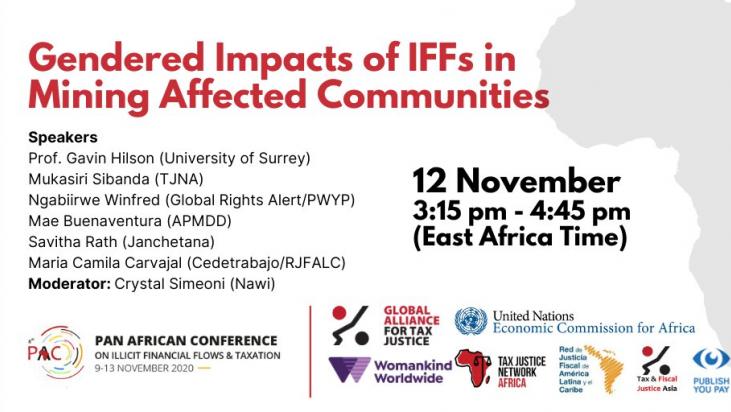Websitehttps://bit.ly/2IkkK5N
As part of the Pan African Conference on Illicit Financial Flows and Taxation (PAC 2020), we are co-sponsoring this session, together with the UN Economic Commission for Africa, Womankind Worldwide, Tax Justice Network Africa, Tax and Fiscal Justice Asia, Red de Justicia Fiscal de América Latina y el Caribe and Publish What You Pay.
Gendered impacts of IFFs in mining-affected communities
12 November, from 3:15 to 4:45 pm (East Africa Time)
Registrations: https://bit.ly/2IkkK5N
Interpretation into Spanish, French and Hindi
About the 8th Pan African Conference on Illicit Financial Flows and Taxation (PAC 2020)
The conference will be a combination of in-country physical events (where possible) as well as virtual breakaway and plenary sessions held under the theme: “The Africa We Want Post COVID-19: Optimizing Domestic Resource Mobilization from the Extractive Sector for Africa’s Transformation.”
Background
The Covid-19 pandemic continues to expose and deepen existing inequalities including gender inequality. It has highlighted the need for Global South countries to maximize domestic resource mobilization as a source of development finance including for reducing gender inequalities by 2030. However, austerity measures, regressive tax policies and core flaws in international financial architecture including financial secrecy policies that enable tax havens, have facilitated widespread race-to-the-bottom tax dodging to the benefit of male-dominated corporations and the rich—while limiting funding for public services such as education, healthcare, water and sanitation, and social protection for rural women.
One of the hallmarks of countries dependent on extractives revenues is abandonment of progressive tax provisions as governments cater to the needs of extractive operations. At the same time, among the most egregious tax dodgers are extractives companies, which enjoy preferential tax treatment and figure in aggressive tax abuse practices within and across jurisdictions. The results include erosion of domestic tax revenues, local economies, and women’s livelihoods; destruction of traditional sources of food and medicines especially of indigenous women; and increasing gender-based discrimination and violence, among others
Women need to be recognized as significant agents of social and economic transformation within their communities. They are full citizens of states who should fully share in the social contract between state and citizen and their social services needs taken care of and not be relegated to farm inputs, access to water, land tenure and cheap free labour. But they are also among the most invisible and disposable in mining communities, where their rights to work, health, a clean and safe environment, essential services and natural resources, are run roughshod by mining corporations. Using tax and gender perspectives are vital in claiming and defending these rights. Rural women will never be truly empowered if macroeconomic policy and global financial flows that currently perpetuate inequalities are not addressed. Tax abuses deprive countries of domestic resources they need to fund public services and programs (including education and training) to ensure women have access to decent work.
Objectives
- Emphasize Global South perspectives and voices to highlight national-to-international links between gender and tax issues with a focus on women in mining-affected communities, share strategies,
- Discuss opportunities for continued collaborative action to empower them and end inequality by operationalizing gender equality tax and gender justice legal principles.
- Advocate for governments to take action to address the broken global tax system, which continues to undermine the rights of women and girls. Solutions include establishing a UN global tax commission where all governments have a seat at the table to decide international tax policies, and for governments to apply a gender lens to both spending and raising taxes progressively to fund public services for all. Specifically, we want to advance the call for a legally binding instrument on business and human rights, harmonized with the CEDAW and other core international human rights treaties.
Agenda
- Opening
- Presentations:
1. Professor Gavin Hilson BSc PhD DIC (UNECA Rep) – Global overview and compelling examples
2. Savitha Rath of Janchetana Raigarh, Chattisgarh, India – Asia Grassroots representative experience sharing
3. Mae Buenaventura, Deputy Coordinator, Asia People´s Movement on Debt and Development (APMDD) – Asia overview and recommendations
4. Winfred Ngabiirwe, Executive Director, of Global Rights Alert a member of Publish What you Pay (PWYP) – Africa experience sharing
5. Mukasiri Sibanda, Tax and Natural Resource Governance Consultant, Tax Justice Network Africa (TJNA) – Africa recommendations
6. Maria Camila Carvajal, Economist and Research Coordinator at Cedetrabajo, Red de Justicia Fiscal de América Latina y el Caribe (RJFALC) – LAC overview and recommendations
- Audience discussion (Q&A)
- Closing
